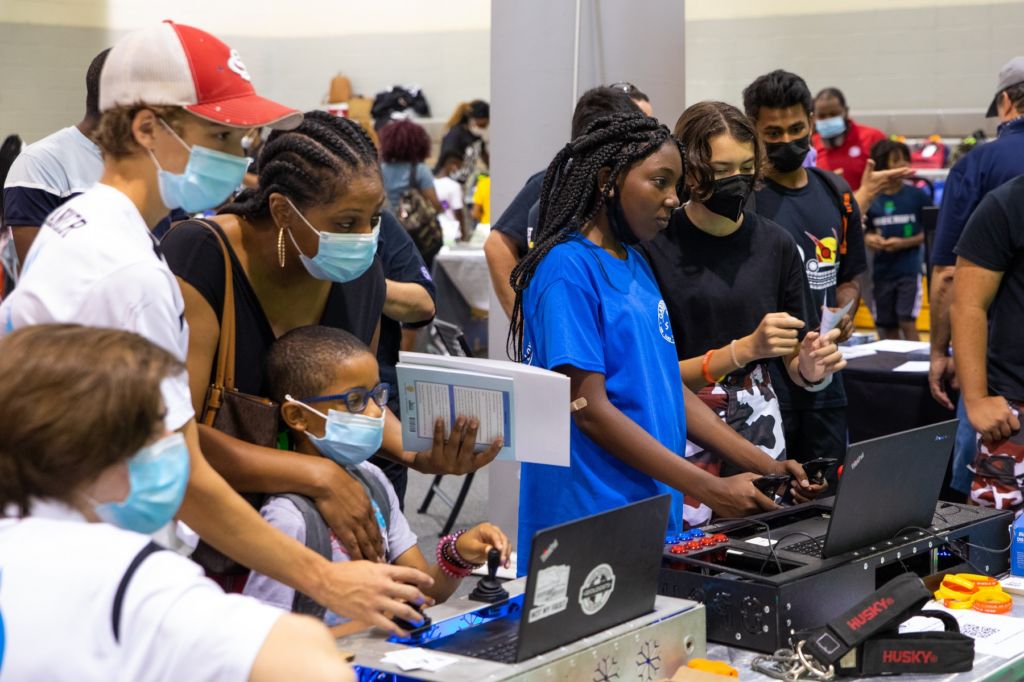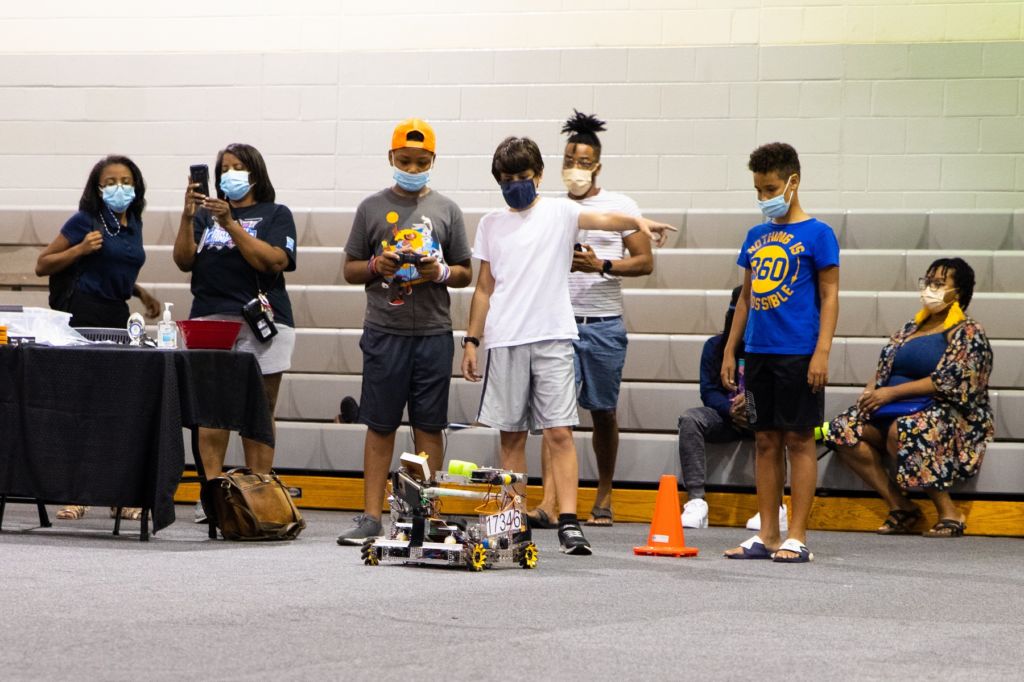Queen City Robotics Alliance STEM-ulating Young Minds

By Giovanna Torres
It’s difficult for kids to imagine growing up to do something they’ve never experienced or heard of before. That’s why Queen City Robotics Alliance (QCRA) is exposing students to new possibilities one camp at a time.
Its upcoming Drone and Robot Demonstrations and Virtual STEM Summer Camps respond to the community feedback ASC’s Culture Blocks has received from Northwest Charlotte residents, who expressed interest in youth Science, Technology, Engineering, and Mathematics, or STEM, programs. Free admission and intentional venues closer to home such as Wallace Pruitt and Tuckaseegee recreation centers make the program affordable and accessible.
“Our goal is to bring the program to kids from communities that are underrepresented in STEM,” said QCRA President Kaiwen Cheng.
Charlotte’s rapid growth as a fintech, healthcare and research hub has created many jobs that fall under the STEM field, but there are not enough homegrown candidates to meet the demand.
“A STEM job is a high paying job. Shouldn’t we encourage our people, the next generation, to get a STEM job? Why don’t we introduce more people in the community to STEM careers and fill our jobs with our own children?” he said. “I can guarantee you we would still have a surplus and we would need to keep importing talent, but let’s help ourselves at the same time.”
Queue the Robots!

Even though the opportunity is huge, many students struggle to see themselves in STEM.
“There are a lot of smart kids, but for some reason they don’t believe they are qualified to be engineers,” Cheng said.
So, QCRA is introducing STEM to Charlotte-Mecklenburg middle and high schoolers in a fun and exciting way – competitive sports and cool robots.
“How many of the kids who play sports become a pro athlete?” Cheng asked. “We still put them through it because we say they’ll learn to play in a team and gain leadership skills. Through our robotics program, they learn teamwork and sportsmanship as well, all the critical skills they would learn in sports, but here’s the bonus – every one of our athletes can turn pro.”
QCRA’s core program – FIRST Robotics Competition – is described as a mind sport. Each season, high-school students are given a new challenge and under strict rules and limited time and resources, they design, prototype, build and program 125-lb robots to play a field game against other competitors.
But there’s more to it. The students get to run the robots as a small business.
“You don’t run the gear in your backyard – you must buy the parts,” Cheng said. “We teach them how to run/sustain a team – fundraising, outreach, sponsorships, marketing, etc. It’s not just building a robot.”
This allows students to rotate positions and try different fields; before they graduate from high school, they’ve already figured out what jobs they like and don’t like.
For Cheng, a question still remains.
“How can we get more students in the program?” he asks. “We know our kids are career-ready and college-ready. The program works.”
The challenge, he said, is getting students through the pipeline.
“That why I’m excited about this partnership with ASC,” he said. “It will help us bring the program into the community.”
Tackling Disparities in STEM
It’s no secret there are gender, racial and ethnic diversity issues facing STEM-related industries. Girls, minorities and children from low-income families often are not encouraged to pursue STEM or don’t have access to the same education, resources, mentors or opportunities as others. QCRA’s priority is to provide and expand access.
“Unless somebody intentionally brings that programming to the community that has needs, the gap is really hard to close,” Cheng said.
ASC’s Culture Blocks helps QCRA engage historically excluded communities – “something that otherwise would be very hard for an organization to do on its own,” Cheng said. “Culture Blocks’ resources allow us to do our work in the areas where it’s needed the most.”
Having volunteers that look like the students also makes an impact.
“By just standing in front of the kids, you are sending a powerful message,” said Cheng, who intentionally works to have mentors from historically excluded communities. “If you put somebody [in front of them] who looks like them and made it, they will start thinking ‘maybe I can, too.’ That’s what we want.”
After attending one of QCRA’s summer camps, a fourth grader from Druid Hills was asked in school what she thought an engineer looks like. Her answer – “female, Black, Asian…pretty much everybody.”
That’s what happens when kids are introduced to different paths and disciplines.
“[Children] take the second step on their own,” Cheng said. “As long as you provide them opportunities, they will surprise you.”
Involve Your Kids in STEM
Queen City Robotics Alliance has four free upcoming virtual and in-person program offerings sponsored by ASC Culture Blocks:
- Drone and Robot Demonstration, 1:30 p.m. Saturday, May 21, Tuskaseegee Recreation Center.
- Drone and Robot Demonstrations, 1:30 Saturday, June 4, Wallace Pruitt Recreation Center.
- Virtual STEM Summer Camp – Level 1 Coding and 3D Modeling, Monday, June through Thursday, June 16.
- Virtual STEM Summer Camp – Level 2 Coding and 3D Modeling, Monday, June 20 through Thursday, June 23.
Stay up to date on all upcoming Culture Blocks programs at ArtsAndScience.com/CultureBlocks.

